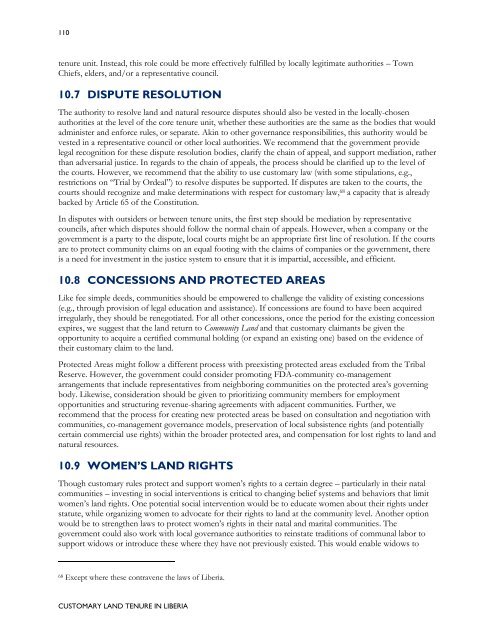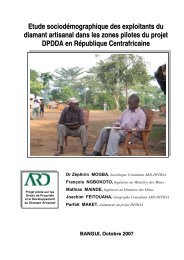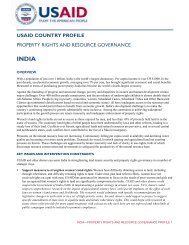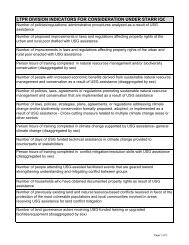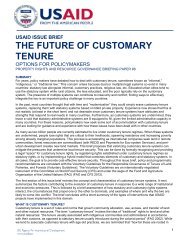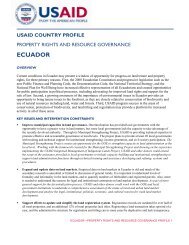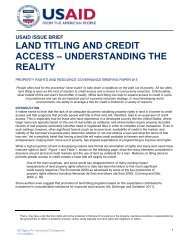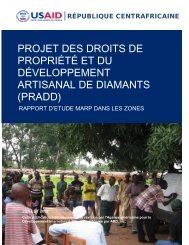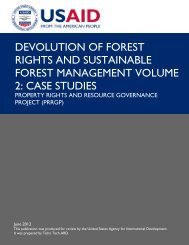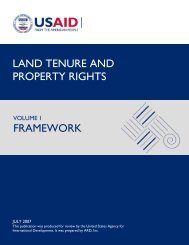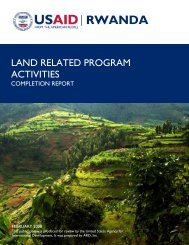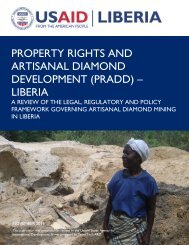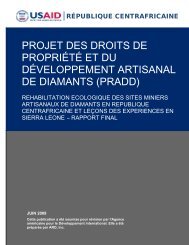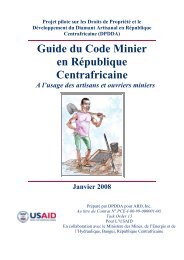Customary Land Tenure in Liberia - Land Tenure and Property ...
Customary Land Tenure in Liberia - Land Tenure and Property ...
Customary Land Tenure in Liberia - Land Tenure and Property ...
Create successful ePaper yourself
Turn your PDF publications into a flip-book with our unique Google optimized e-Paper software.
110<br />
tenure unit. Instead, this role could be more effectively fulfilled by locally legitimate authorities – Town<br />
Chiefs, elders, <strong>and</strong>/or a representative council.<br />
10.7 DISPUTE RESOLUTION<br />
The authority to resolve l<strong>and</strong> <strong>and</strong> natural resource disputes should also be vested <strong>in</strong> the locally-chosen<br />
authorities at the level of the core tenure unit, whether these authorities are the same as the bodies that would<br />
adm<strong>in</strong>ister <strong>and</strong> enforce rules, or separate. Ak<strong>in</strong> to other governance responsibilities, this authority would be<br />
vested <strong>in</strong> a representative council or other local authorities. We recommend that the government provide<br />
legal recognition for these dispute resolution bodies, clarify the cha<strong>in</strong> of appeal, <strong>and</strong> support mediation, rather<br />
than adversarial justice. In regards to the cha<strong>in</strong> of appeals, the process should be clarified up to the level of<br />
the courts. However, we recommend that the ability to use customary law (with some stipulations, e.g.,<br />
restrictions on “Trial by Ordeal”) to resolve disputes be supported. If disputes are taken to the courts, the<br />
courts should recognize <strong>and</strong> make determ<strong>in</strong>ations with respect for customary law, 68 a capacity that is already<br />
backed by Article 65 of the Constitution.<br />
In disputes with outsiders or between tenure units, the first step should be mediation by representative<br />
councils, after which disputes should follow the normal cha<strong>in</strong> of appeals. However, when a company or the<br />
government is a party to the dispute, local courts might be an appropriate first l<strong>in</strong>e of resolution. If the courts<br />
are to protect community claims on an equal foot<strong>in</strong>g with the claims of companies or the government, there<br />
is a need for <strong>in</strong>vestment <strong>in</strong> the justice system to ensure that it is impartial, accessible, <strong>and</strong> efficient.<br />
10.8 CONCESSIONS AND PROTECTED AREAS<br />
Like fee simple deeds, communities should be empowered to challenge the validity of exist<strong>in</strong>g concessions<br />
(e.g., through provision of legal education <strong>and</strong> assistance). If concessions are found to have been acquired<br />
irregularly, they should be renegotiated. For all other concessions, once the period for the exist<strong>in</strong>g concession<br />
expires, we suggest that the l<strong>and</strong> return to Community <strong>L<strong>and</strong></strong> <strong>and</strong> that customary claimants be given the<br />
opportunity to acquire a certified communal hold<strong>in</strong>g (or exp<strong>and</strong> an exist<strong>in</strong>g one) based on the evidence of<br />
their customary claim to the l<strong>and</strong>.<br />
Protected Areas might follow a different process with preexist<strong>in</strong>g protected areas excluded from the Tribal<br />
Reserve. However, the government could consider promot<strong>in</strong>g FDA-community co-management<br />
arrangements that <strong>in</strong>clude representatives from neighbor<strong>in</strong>g communities on the protected area‟s govern<strong>in</strong>g<br />
body. Likewise, consideration should be given to prioritiz<strong>in</strong>g community members for employment<br />
opportunities <strong>and</strong> structur<strong>in</strong>g revenue-shar<strong>in</strong>g agreements with adjacent communities. Further, we<br />
recommend that the process for creat<strong>in</strong>g new protected areas be based on consultation <strong>and</strong> negotiation with<br />
communities, co-management governance models, preservation of local subsistence rights (<strong>and</strong> potentially<br />
certa<strong>in</strong> commercial use rights) with<strong>in</strong> the broader protected area, <strong>and</strong> compensation for lost rights to l<strong>and</strong> <strong>and</strong><br />
natural resources.<br />
10.9 WOMEN’S LAND RIGHTS<br />
Though customary rules protect <strong>and</strong> support women‟s rights to a certa<strong>in</strong> degree – particularly <strong>in</strong> their natal<br />
communities – <strong>in</strong>vest<strong>in</strong>g <strong>in</strong> social <strong>in</strong>terventions is critical to chang<strong>in</strong>g belief systems <strong>and</strong> behaviors that limit<br />
women‟s l<strong>and</strong> rights. One potential social <strong>in</strong>tervention would be to educate women about their rights under<br />
statute, while organiz<strong>in</strong>g women to advocate for their rights to l<strong>and</strong> at the community level. Another option<br />
would be to strengthen laws to protect women‟s rights <strong>in</strong> their natal <strong>and</strong> marital communities. The<br />
government could also work with local governance authorities to re<strong>in</strong>state traditions of communal labor to<br />
support widows or <strong>in</strong>troduce these where they have not previously existed. This would enable widows to<br />
68 Except where these contravene the laws of <strong>Liberia</strong>.<br />
CUSTOMARY LAND TENURE IN LIBERIA


